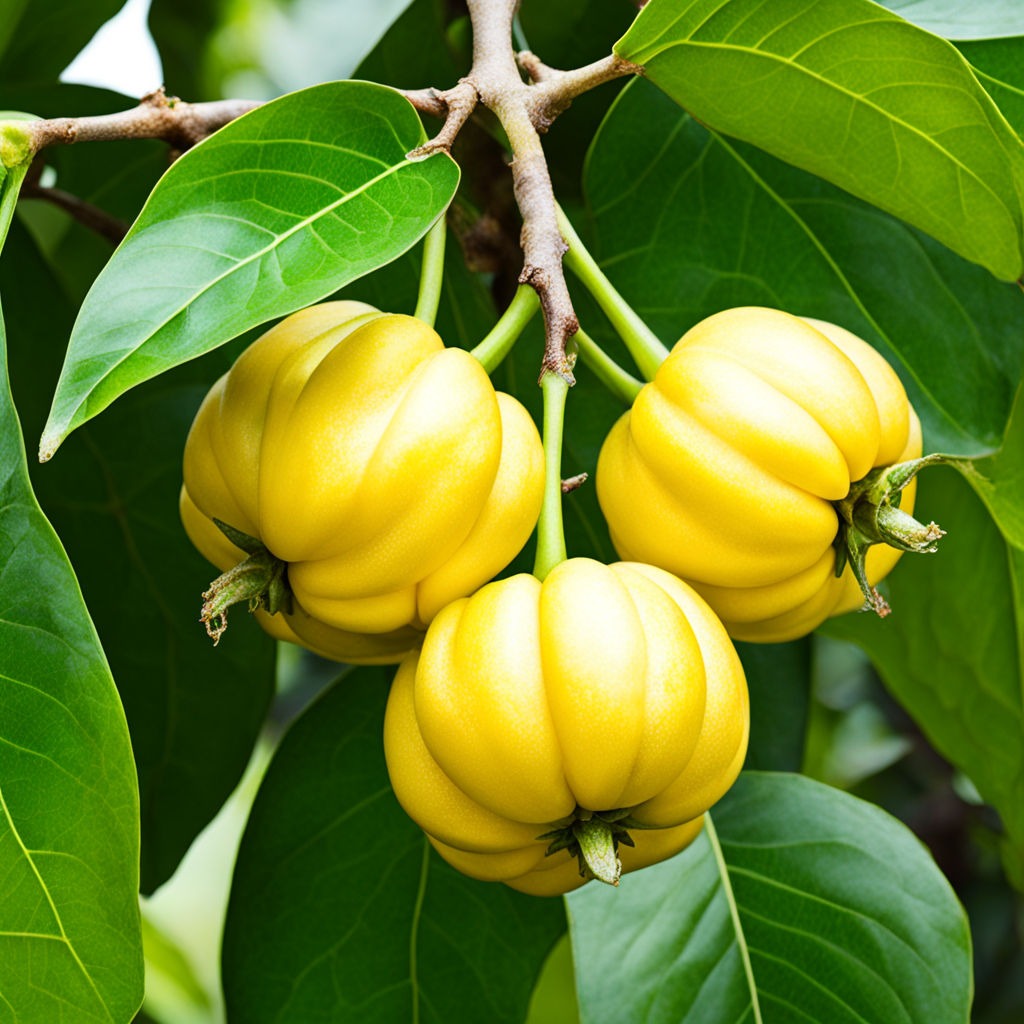Introduction

Garcinia Cambogia is a small, pumpkin-shaped fruit native to Southeast Asia and India. It has been used for centuries in traditional medicine and culinary practices. The fruit is known for its sour flavor, which is often utilized in cooking and food preservation. The active ingredient in Garcinia Cambogia is Hydroxycitric Acid (HCA), which is believed to have various health benefits, particularly in weight management and appetite suppression.
Popularity in the Health and Wellness Community
In recent years, Garcinia Cambogia has gained significant popularity in the health and wellness community, primarily due to its purported weight loss benefits. It became widely known after being featured on various health shows and endorsed by several celebrities and fitness experts. The supplement market has seen a surge in Garcinia Cambogia products, including capsules, powders, and extracts, all claiming to aid in weight loss and overall health improvement. Explore the rise in popularity and the range of products available in the market.
Botanical Profile

Garcinia Cambogia, also known as Malabar tamarind, is a tropical fruit-bearing tree belonging to the Clusiaceae family. The tree is small to medium in size, with a dense, rounded crown and dark green, glossy leaves. The fruit itself is small and green when unripe, turning a yellowish or reddish color upon ripening. It resembles a small pumpkin with vertical lobes and has a thin rind. The rind and extracts from the fruit are often used in supplements due to their high concentration of Hydroxycitric Acid (HCA), which is the primary active compound associated with the plant’s health benefits.
Geographic Distribution and Natural Habitat
Garcinia Cambogia is native to Southeast Asia, including regions such as Indonesia, Malaysia, and Thailand, as well as parts of India and Sri Lanka. It thrives in tropical climates with well-drained soil and can often be found in moist forests and riverbanks. The tree is adaptable and can also be cultivated in tropical and subtropical regions around the world.
Active Components
Hydroxycitric Acid (HCA) is the primary active compound found in the rind of Garcinia Cambogia. HCA is believed to play a crucial role in the fruit’s weight loss and appetite suppression effects. It works by inhibiting the enzyme citrate lyase, which is involved in the conversion of carbohydrates into fat. By blocking this enzyme, HCA may reduce the storage of fat in the body and enhance the metabolism of carbohydrates. Additionally, HCA is thought to increase serotonin levels in the brain, which can help reduce cravings and emotional eating.
Other Significant Compounds in Garcinia Cambogia
- Xanthones: These are polyphenolic compounds with antioxidant properties, which can help protect the body from oxidative stress and inflammation.
- Garcinol: This compound is known for its anti-inflammatory and antioxidant effects. It may also play a role in supporting digestive health and preventing certain diseases.
- Benzophenones: These compounds have been studied for their potential anticancer and antimicrobial properties.
Health Benefits

Garcinia Cambogia has gained widespread popularity for its potential weight loss benefits. The active ingredient, Hydroxycitric Acid (HCA), is primarily responsible for this effect. HCA works by inhibiting an enzyme called citrate lyase, which plays a role in converting carbohydrates into fats. By blocking this enzyme, Garcinia Cambogia can reduce the production and storage of fat in the body. Additionally, HCA has been reported to increase the levels of serotonin, a neurotransmitter in the brain that can help regulate mood and appetite. This increase in serotonin may lead to reduced cravings and emotional eating, further supporting weight management efforts.
Appetite Suppression: Mechanisms and Effectiveness
One of the key reasons Garcinia Cambogia is popular among those looking to lose weight is its reported ability to suppress appetite. The increase in serotonin levels not only helps improve mood but also signals to the brain that the body is full, thereby reducing overall food intake. This mechanism of action makes Garcinia Cambogia an effective supplement for those who struggle with overeating or cravings. Clinical studies have shown that participants taking Garcinia Cambogia extract experienced a significant reduction in appetite compared to those who did not.
Metabolism Boost: Impact on Metabolic Rate
In addition to weight loss and appetite suppression, Garcinia Cambogia has been reported to have a positive impact on metabolic rate. By enhancing the body’s ability to metabolize carbohydrates, Garcinia Cambogia helps increase energy levels and improve overall metabolic efficiency. This boost in metabolism can contribute to more effective weight loss and better maintenance of a healthy weight. The ability of HCA to inhibit citrate lyase not only reduces fat storage but also promotes the utilization of existing fat stores for energy, further aiding in weight management.
Potential Benefits for Cholesterol and Blood Sugar Levels

Beyond its weight loss and appetite suppression benefits, Garcinia Cambogia may also positively impact cholesterol and blood sugar levels. Some studies suggest that taking Garcinia Cambogia extract can help lower LDL (bad) cholesterol and triglycerides while increasing HDL (good) cholesterol. This effect can contribute to better heart health and reduce the risk of cardiovascular diseases. Additionally, Garcinia Cambogia has been reported to help regulate blood sugar levels by improving glucose metabolism. This can be particularly beneficial for individuals with insulin resistance or type 2 diabetes. Discover more about the potential benefits of Garcinia Cambogia for cholesterol and blood sugar levels.
Safety Considerations
While Garcinia Cambogia offers several health benefits, it is essential to be aware of potential risks and side effects. Some users have reported experiencing liver damage after taking Garcinia Cambogia supplements. Therefore, it is crucial to consult a healthcare professional before starting any new supplement regimen, especially if you have pre-existing health conditions or are taking other medications. Ensuring that you purchase Garcinia Cambogia from reputable sources can also help mitigate the risk of adverse effects. Read more about the safety and risks associated with Garcinia Cambogia.
Scientific Evidence

The scientific community has conducted various studies to investigate the health benefits of Garcinia Cambogia, with a particular focus on its effects on weight loss and appetite suppression. Several animal and human studies have explored the potential of Hydroxycitric Acid (HCA), the active compound in Garcinia Cambogia, to promote weight management and enhance metabolic health. A comprehensive review of these studies reveals mixed results, with some showing significant benefits while others indicate minimal or no effects.
One notable study published in the Journal of Obesity analyzed the results of multiple clinical trials and concluded that Garcinia Cambogia can lead to short-term weight loss, although the effect size is generally small. The meta-analysis suggested that HCA might help reduce body weight, but the results were not consistent across all studies. Explore the detailed findings of this review.
Analysis of Clinical Trials on Weight Loss and Appetite Suppression
Several clinical trials have been conducted to assess the efficacy of Garcinia Cambogia in promoting weight loss and suppressing appetite. One well-known trial involved overweight participants who were given either Garcinia Cambogia extract or a placebo for a period of 12 weeks. The study found that those taking Garcinia Cambogia experienced a significant reduction in body weight and BMI compared to the placebo group. Additionally, the participants reported a decrease in appetite, which was attributed to the HCA content.
However, other clinical trials have produced conflicting results. For instance, a study published in JAMA found no significant difference in weight loss between the Garcinia Cambogia group and the placebo group over an 8-week period. The researchers concluded that while Garcinia Cambogia might have some impact on weight loss, it is not substantial enough to be considered a reliable standalone treatment for obesity.
Discussion on the Consistency and Reliability of Scientific Evidence
The inconsistency in scientific findings regarding Garcinia Cambogia can be attributed to several factors, including variations in study design, sample size, dosage, and duration of treatment. While some studies demonstrate promising results, others fail to show significant benefits, leading to ongoing debates about the reliability and effectiveness of Garcinia Cambogia as a weight loss supplement.
It is important to note that many studies have methodological limitations, such as small sample sizes and short study durations, which can impact the overall validity of the findings. Moreover, the placebo effect and participants’ adherence to diet and exercise regimens can also influence the outcomes.
Given the mixed evidence, it is crucial for consumers to approach Garcinia Cambogia supplements with caution and consider them as part of a broader, holistic approach to weight management that includes a healthy diet and regular physical activity. Consulting with healthcare professionals before starting any supplement regimen is also advisable to ensure safety and efficacy. Learn more about the scientific evidence and ongoing research on Garcinia Cambogia.
Usage and Dosage
The appropriate dosage of Garcinia Cambogia can vary depending on the specific health benefit being targeted. For weight loss and appetite suppression, the most commonly recommended dosage is between 500 to 1,000 milligrams of Garcinia Cambogia extract, taken three times daily, 30 to 60 minutes before meals. This dosage typically contains 50-60% Hydroxycitric Acid (HCA), which is the active component believed to contribute to the supplement’s effects.
Forms of Garcinia Cambogia Supplements
- Capsules: This is the most common form of Garcinia Cambogia supplements. Capsules are easy to take, convenient for travel, and typically come in pre-measured doses to ensure consistency.
- Powders: Garcinia Cambogia powder can be mixed with water, juice, or smoothies. This form is flexible in terms of dosage adjustment and can be incorporated into different recipes.
- Extracts: Garcinia Cambogia extracts are highly concentrated forms of the supplement. They can be taken directly or mixed with other liquids. Extracts often provide a higher potency of HCA per serving compared to capsules or powders.
Guidelines for Safe Consumption
While Garcinia Cambogia is generally considered safe for most people when taken at recommended dosages, there are important guidelines to follow to ensure safe consumption:
- Consult a Healthcare Professional: Before starting any new supplement, it is crucial to consult with a healthcare provider, especially if you have pre-existing medical conditions, are pregnant or breastfeeding, or are taking other medications.
- Follow Dosage Instructions: Adhere to the dosage instructions provided on the supplement label or by your healthcare provider. Do not exceed the recommended dosage as it can increase the risk of side effects.
- Choose Reputable Brands: Purchase Garcinia Cambogia supplements from reputable brands and suppliers to ensure product quality and safety. Look for supplements that have been third-party tested for purity and potency.
- Monitor for Side Effects: Be aware of potential side effects, which may include digestive issues, headaches, and dizziness. If you experience any adverse reactions, discontinue use and consult a healthcare professional immediately.
- Avoid Long-term Use: Garcinia Cambogia is generally recommended for short-term use. Prolonged use may increase the risk of side effects and has not been thoroughly studied for long-term safety.
Potential Side Effects and Risks
While Garcinia Cambogia is generally considered safe for most people when taken at recommended dosages, it can cause some side effects. The most commonly reported side effects include:
- Digestive Issues: Some users experience gastrointestinal problems such as nausea, diarrhea, and stomach cramps. These symptoms are typically mild and subside with continued use.
- Headaches: Headaches have been reported by some individuals taking Garcinia Cambogia supplements. This side effect is usually temporary.
- Dizziness: A few users have reported feeling lightheaded or dizzy after taking Garcinia Cambogia.
Long-term Safety Considerations
The long-term safety of Garcinia Cambogia is not well-documented. Most studies on Garcinia Cambogia have been short-term, typically lasting 8 to 12 weeks. Therefore, the effects of prolonged use remain uncertain. Some concerns have been raised about the potential for liver toxicity, especially with high doses or extended use.
There have been reports of liver damage in individuals taking Garcinia Cambogia supplements. While these cases are rare, they highlight the importance of caution, especially for those with pre-existing liver conditions or a history of liver issues. It is advisable to limit the use of Garcinia Cambogia to short-term periods unless otherwise directed by a healthcare professional.
Contraindications and Interactions with Medications
Garcinia Cambogia may interact with certain medications and is not suitable for everyone. Key contraindications and interactions include:
- Pregnancy and Breastfeeding: Due to a lack of sufficient research, Garcinia Cambogia is not recommended for pregnant or breastfeeding women.
- Liver Conditions: Individuals with liver disease or a history of liver problems should avoid Garcinia Cambogia, as there have been reports of liver toxicity.
- Medications for Diabetes: Garcinia Cambogia may lower blood sugar levels, which can interact with diabetes medications such as insulin or metformin. This interaction could lead to dangerously low blood sugar levels (hypoglycemia).
- Statins: People taking statin medications to lower cholesterol should be cautious, as Garcinia Cambogia may increase the risk of muscle degeneration (rhabdomyolysis).
- Antidepressants: Garcinia Cambogia may increase serotonin levels, which can interact with antidepressants such as selective serotonin reuptake inhibitors (SSRIs) and lead to serotonin syndrome, a potentially life-threatening condition.
Before starting Garcinia Cambogia, it is crucial to consult with a healthcare provider to evaluate potential interactions with existing medications and consider any underlying health conditions.
